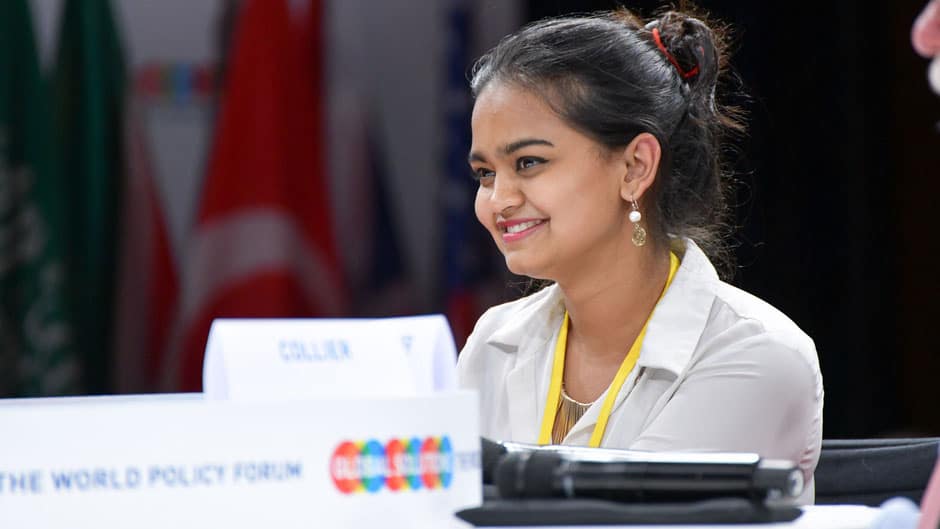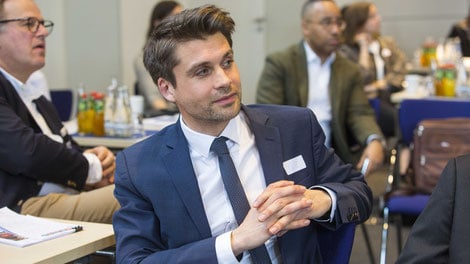A commentary by Dalya Alnajjar and Daniela Muhaj (YGCs, 2019)
It started on the second day of the Global Solutions Summer School, when Kavindya Thennakoon took the first step of what some later called a “small revolution.” It led to an amazing chain reaction which challenged the makeup of panels at the Summer School and the Global Solutions Summit.
From day one, it was clear that there is a sense of urgency among the Young Global Changers (YGCs). They are living up to the responsibility that comes with a commitment to make the world a better place by acting to change the status quo.
The Global Solutions Summer School in Berlin brings together 90 young changemakers from 60 countries, with different backgrounds and experiences, to discuss pressing global challenges during the Global Solutions Summit. Thennakoon questioned the diversity and inclusiveness of the panels’ speakers in such venues. She noted that the speakers look very much alike – many were middle-aged, Caucasian, Western men – and that there’s not enough representation of young people or minorities at the panels, although these individuals are often the focus of the conversation.

Thennakoon’s remarks were applauded by fellow YGCs in the room, who believe they are qualified and ready to participate in the panels. In fact, they had already been challenging the speakers with thoughtful questions and by providing insightful remarks based on their own first-hand experiences. Commenting on the move Thennakoon said, “I felt that panels were talking about communities in the context of poverty and diversity, but rarely included individuals who were directly impacted by these issues. Diversity isn’t just a tick in the box. It needs to be a conscious action.”
Thennakoon is from the small village of Deraniyagala in Sri Lanka and is a community and development activist. She works on design anthropology and education. Thennakoon also co-founded and directs “Without Borders,” an enterprise that designs training and education models for rural schools and educators. The objective is to empower individuals as well as communities to become part of the solution to the problems that they face. In this spirit, Thennakoon brought her experiences to the summit and actively asked for her seat at the table to tackle our generations biggest issues.
In the following panel, Paradigm Change in Different Local Contexts, the moderator Bethan Grillo, director of consultancy PwC’s Global Purpose division, recognized the opportunity in Thennakoon ´s call for action: Grillo invited her to co-moderate the panel. This move was a reminder that we have the power to make change happen here and now and was enthusiastically welcomed by the YGCs and other speakers. Following the panel, Grillo commented: “There’s always space to put another chair!” Grillo shared her own challenges in securing a place at the table and how she uses her position to empower other young activists.
Grillo’s action initiated a chain reaction and the other moderators followed her lead for the rest of the panels. Abir Ibrahim, a Sudanese-American thought-leader on social and economic development, volunteered to co-moderate the panel on The Role of Sustainable Infrastructure in Achieving Inclusive Growth. The concluding panel Beyond GDP was co-moderated by Stephanie Trpokv from Croatia – an expert consultant on strategic industrial transformation. Trpokv advises policy makers and institutions on devising effective private sector development practices and nurturing lasting innovation ecosystems.
Maya Almog from Israel commented, “it’s impressive to see both sides working together to change the paradigm. Kavindya spoke up; Bethan heard her call and took the initiative. We are here because we speak up, and we are here to speak up. This is exactly what Kavindya did.”
Even though a chair at the table is only a small first step, YGCs now refer to the occurring as their own “small revolution” because it is a symbolic reminder of how youth engagement and persistence can yield results and promote inclusion. They are putting much energy and dedication to contributing to the world, while recognizing that paradigms rarely shift overnight, instead progress is the sum of a multitude of smaller yet meaningful contributions.

The “small revolution” was crowned with Thennakoon being invited to the stage at the Global Solutions Summit welcome reception in the Berlin City Hall. On the stage with Michael Müller, the mayor of Berlin, Thennakoon had not only the opportunity to introduce the YGCs but to give a short speech on their role in shaping global solutions.
Ole Spies the Director of the Global Solutions Summer School and program manager of the Young Global Changers program, supported the move while committing to integrate this new tradition into the future sessions of the summer school. Spies thinks that the move not only affected the summer school, but most importantly it impacted the speakers who foster policy debate on the international stage, generating a ripple effect. “It was inspiring and very encouraging to witness renowned scholars, policymakers and corporate leaders welcome YGCs to the conversation, provide them with their own space, and listen to their contributions attentively” he elaborated.
He concluded by saying, “at first, I was nervous when she [Kavindya] did not stick to the schedule and her assigned speaking time at the Welcome Reception of the Global Solutions Summit. But in the end challenging existing norms is exactly what the Young Global Changers are here for.”
—
The views and opinions expressed in this article are those of the authors and do not necessarily reflect the views of the Global Solutions Initiative.
